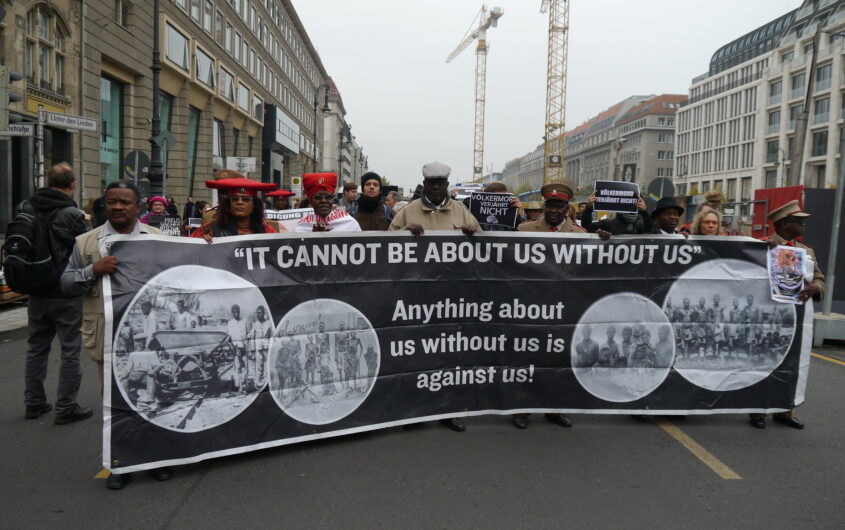
Berlin Postkolonial via Flickr
A Zeitenwende for Whom?

Fabian Krautwald
University College London
Fabian Krautwald is a Lecturer (Assistant Professor) of African History at University College London. He works and teaches on the social, political, cultural, economic, and intellectual history of Africa from the late nineteenth to the early twenty-first century. He is especially interested in comparative and transnational histories, which he explores in Tanzania and Namibia based on vernaculars such as Swahili and Otjiherero. He is currently preparing his first book, which examines the ways in which eastern and southern Africans remembered German colonial rule after its end in the First World War, for publication. Before joining UCL, he held postdoctoral fellowships at Binghamton University in upstate New York and at Princeton University, where he also completed his PhD. His work has appeared in the Journal of Southern African Studies, the International Journal of African Historical Studies, and The Journal of African History, among others.
German Colonial Memory and Epistemic Barriers
On November 21, 2024, The Namibian, Namibia’s leading English-language newspaper, reported that the ongoing negotiations between Namibia and Germany over compensation for the genocide against the Herero and Nama of 1904-1908 are nearing an end. In 1904, the Herero and Nama rebelled against colonial rule because German settlers had increasingly encroached on their land. The resulting genocide killed tens of thousands of Herero and Nama and displaced the survivors across southern Africa. To this day, their descendants continue to suffer from the genocide’s consequences, including the complete dispossession of their land and livestock. The reconciliation agreement would thus mark an important, if extremely belated, symbol of German contrition.
Indeed, the agreement already constitutes an important precedent in the global history of reparations. It is the first-ever state-to-state apology and commitment to compensation for colonial genocide. As such, it constitutes an immense victory for the affected communities and potentially a useful rallying point for other formerly colonized peoples and victims of state mass violence. Within Germany, the debate around the agreement and the so-called Historikerstreit 2.0 have spread awareness of the legacies of the country’s colonial past.
To understand how far-reaching the current conjuncture is, it is helpful to consider the state of German colonial memory a mere generation ago. In 1995, Chancellor Helmut Kohl traveled to the recently independent Namibia as the first head of the government of a reunited Germany. While in the capital Windhoek, Herero activists demonstrated in the central business district and demanded 600 million U.S. dollars as compensation. Kohl rejected requests to meet a Herero delegation. Instead, he met German Namibians whose contributions to developing Namibia he hailed as exemplary. One of the people he refused to meet was Namibian veteran politician and then-Member of the National Assembly Mburumba Kerina. After studying at Lincoln University in Pennsylvania, Kerina in 1956 became the first in-person petitioner to address the United Nations’ Fourth Committee, which was responsible for decolonization. In the subsequent years, he remained a leading voice for Namibian independence. In 1998, he remembered the Kohl visit: “Helmut Kohl came here in 1995 but he refused to see us.”
Kohl’s visit encapsulates the long-held official German position regarding the Namibian genocide. Despite the pioneering work of Namibian and German historians since the 1960s, the process of acknowledging the full extent of the war of 1904-1908 has been painfully slow. The main driver of this process has been and remains the pressure by the Herero and Nama as well as their international allies. All official German positions to the Namibia question have been reactions to this pressure—from Minister Heidemarie Wieczoreck-Zeul’s rogue apology in 2004 to President of the Bundestag Norbert Lammert’s acknowledgment of the genocide in 2015 as well as the onset of government-to-government negotiations that same year. It was Mburumba Kerina, for example, who in 2001 helped to initiate the first reparations court case of the Herero against German companies before U.S. courts under the Alien Tort Statute. In 2017, the late Paramount Chief Vekuii Rukoro brought renewed attention to the issue by leading the second court case for reparations in U.S. courts, this time against the Federal Republic of Germany, which increased the pressure on both governments to conclude their negotiations.
What would an actual Zeitenwende look like? Taking seriously non-Western concepts of history would be a start.
Germany’s record of only yielding to outside pressure in reckoning with its colonial past exposes the limits of the contemporary Zeitenwende, or sea change, in colonial memory. The Historikerstreit 2.0 has not only increased awareness of colonial history but revealed deep conflicts over comparisons between colonial violence and the Shoah. Meanwhile, members of parliament for the far-right Alternative für Deutschland cultivate a revisionist image of German colonialism in which they laud its supposed merits for benighted ‘natives.’
What would an actual Zeitenwende look like? Taking seriously non-Western concepts of history would be a start. The wider German public has remained largely ignorant about how the Herero and Nama think about the genocide of 1904-1908. Until recently, the terms that survivors used in vernacular languages to refer to what happened remained unknown outside of Namibia. For example, Herero speakers nowadays call the genocide otjiṱiro otjindjandja, which translates to mass death. This term, however, only emerged after independence in 1990. In the preceding century, they described the genocide with other words. One was the figure of the “onḓiru onguru” or “old death.” The term refers to a well-known Herero proverb that warns listeners that they will encounter the same death as their ancestors. To remember the genocide in Otjiherero has thus meant voicing a palpable fear of the repeat of its violence.
The second component of a genuine mnemonic Zeitenwende is more empirical history. The debate about comparisons between the Holocaust and 1904-1908 has focused mostly on the exterminatory and ideological logics that underpin genocidal violence. What is still lacking are studies that examine the ways in which communities affected by colonial mass violence have dealt with its aftermath and how these aftermaths have changed over time. Studies in this direction have revealed, for example, that Namibian activists for independence already likened the genocide of 1904-1908 to the Holocaust in the early 1960s to garner support for their cause before fora of Afro-Asian solidarity and the United Nations. Further research in this respect would open comparative perspectives on international anti-imperialist activism in both German states after 1945.
The struggle of postcolonial activists in and outside of Namibia has brought about the present mnemonic conjuncture of German colonial memory. Because of their work, Kohl’s behavior would be considered anathema today. Yet the full import of the current conjuncture remains to be seen, especially if it is not accompanied by a more comprehensive acknowledgment of non-Western epistemologies of history. Unless the perspective of communities affected by colonial violence informs the way Europeans think about the legacy of their empires, we will wait in vain for a real Zeitenwende.








